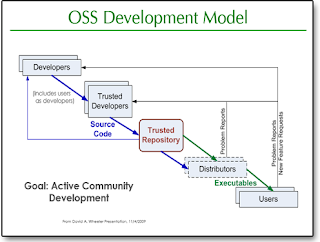Why Open-Source? Power Of Open-Source
Open-source software (OSS) is computer software with its source code made available with a license in which the copyright holder provides the rights to study, change, and distribute the software to anyone and for any purpose. Open source developers choose to make the source code of their software publicly available for the good of the community and to publish their software with an open source license – meaning that other developers can see how it works and add to it. It is software developed by and for the user community. Open source projects provide tremendous opportunities for developers to share and learn through collaboration. Find colleagues for your project or join an existing effort. Contributions aren't limited to code, as projects need a diverse range of skills. Many of the world’s most successful open source projects have their roots in the academy. Participation extends beyond adoption and development, and now includes a wide variety of academic programs and research. Open source doesn't just mean access to the source code. One of the fundamental principles of the open source philosophy is the free exchange of ideas and information for the improvement of the community as a whole. Whether you’re interested in joining a community to lend a helping hand or you’re a developer considering if open source methods are right for your project, there’s a great number of reasons why you should consider embracing open source and everything it can offer. The distribution terms of open-source software must comply with the following criteria:
1. Free Redistribution:
The license shall not restrict any party from selling or giving away the software as a component of an aggregate software distribution containing programs from several different sources. The license shall not require a royalty or other fee for such sale.
2. Source Code:
The program must include source code, and must allow distribution in source code as well as compiled form. The source code must be the preferred form in which a programmer would modify the program. Deliberately obfuscated source code is not allowed. Intermediate forms such as the output of a preprocessor or translator are not allowed.
3. Integrity of The Author's Source Code:
The license must explicitly permit distribution of software built from modified source code. The license may require derived works to carry a different name or version number from the original software.
4. Distribution of License:
The rights attached to the program must apply to all to whom the program is redistributed without the need for execution of an additional license by those parties.
And Many More...
The open-source model is a decentralized development model that encourages open collaboration. A main principle of open-source software development is peer production, with products such as source code, blueprints, and documentation freely available to the public. The Open Source model harnesses the power of distributed peer review and transparency to create high-quality, secure and easily integrated software at an accelerated pace and lower cost.
Primary benefits of open source software are:
1. Choice: By its name, the source code of open source software is available to all, meaning that no one company owns the software. A customer can easily choose another vendor because they are not locked in to one vendor’s offering as it may be operated and maintained by multiple vendors, reducing both barriers to entry and exit.
2. Reliability: Open source is peer reviewed software, which leads to more reliability. The infrastructure of the Internet is largely composed of open-source programs such as Apache, DNS, languages such as HTML and Perl. They have proven to be both reliable and robust.
3. Security: Open source enables anyone to examine software for security flaws. The continuous and broad peer-review enabled by publicly available source code improves security through the identification and elimination of defects that might otherwise be missed. The availability of source code also facilitates in-depth security reviews and audits by government customers.
4. Low-cost: Open source software is often developed through community forums and collaboratives. Developers volunteer their time and expertise, and are coordinated by fewer paid programmers. They are even more attractive to businesses during tough economic times. It has been estimated that open source software collectively saves businesses $60 billion a year
Another benefit of contributing to open source is that you can use that opportunity to refine your development skills. Even if you’re a seasoned developer, there’s always something you can learn by reading through other people’s code. The great thing about joining in on open source endeavors is that you can help other developers in the community. Your contributions along with everyone else’s improves the project as a whole.
Few Free and Open Software Programs
Firefox
Thunderbird
OpenOffice
VLC Media Player
Audacity
Filezilla
Handbrake
TrueCrypt
PDFCreator
Notepad2
VirtualBox
Notepad++
Inkscape
GnuCash
GIMP
MailScanner
Apache HTTP Server
NGINX
Node.js
Google Chrome
Safari
If you are benefited through this post, so please share it.


Why Open-Source? Power Of Open-Source >>>>> Download Now
ReplyDelete>>>>> Download Full
Why Open-Source? Power Of Open-Source >>>>> Download LINK
>>>>> Download Now
Why Open-Source? Power Of Open-Source >>>>> Download Full
>>>>> Download LINK ml